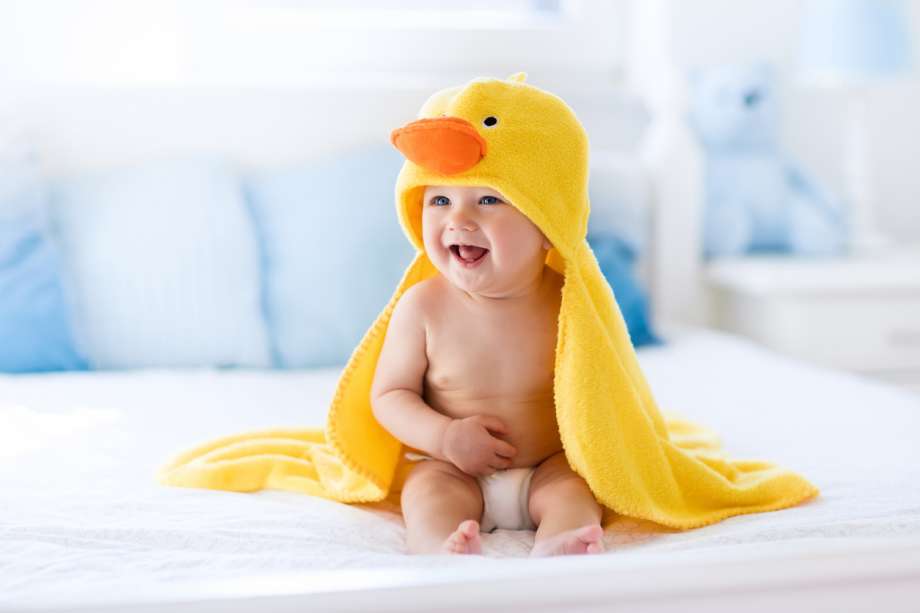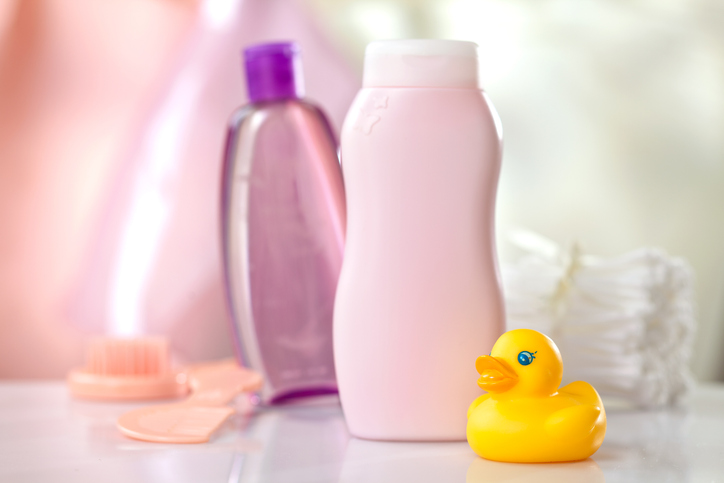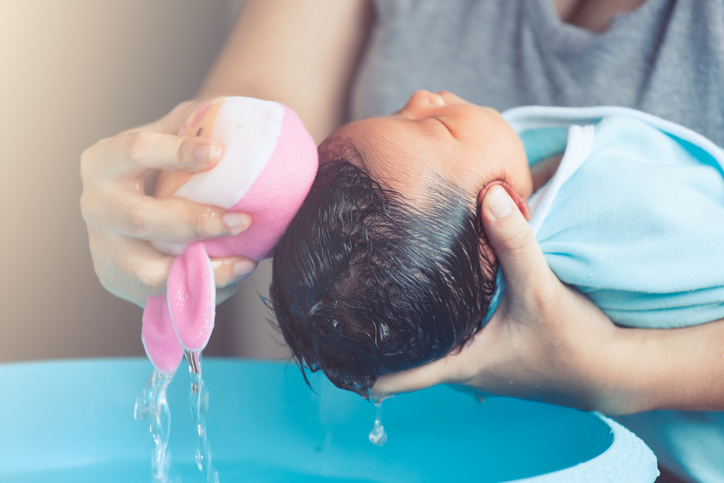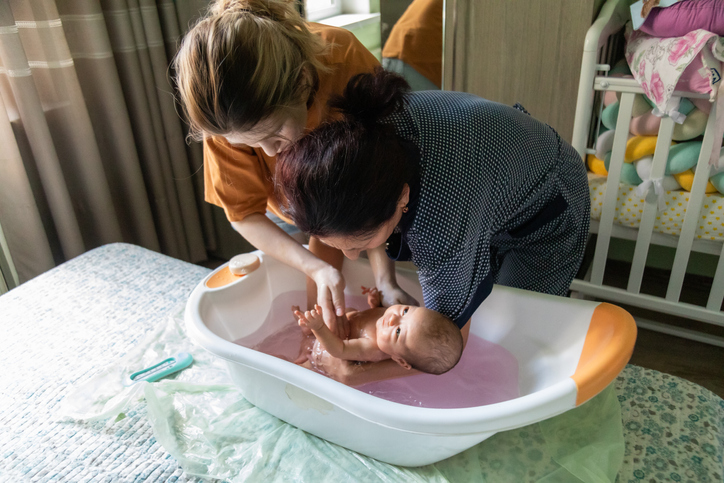The Ultimate Guide to Choosing Baby Shampoo

An infant’s skin is very sensitive and prone to drying, so the AAP recommends that you use the mildest soap and baby shampoo there is when it comes to bath time. Do not use shampoo, body washes, or lotions that are labeled as antibacterial. Aim for those that are fragrance-free.
Shampoo Chemicals to Avoid
Specifically, when buying baby shampoo, be sure to review the ingredient list. Similar to packaged foods, if the ingredient list is excessively long and complicated and contains substances that are very difficult to pronounce, that’s a pretty good clue that it’s probably full of unnatural and unsafe additives that can irritate your baby’s skin. Some benefits and risks involved with certain ingredients are more controversial, such as glycerin, but there are some chemicals that you should definitely avoid when choosing a baby shampoo:
1. Parabens
Parabens are a type of artificial preservative added to food, body care products, cosmetics, pharmaceuticals, beverages and more. In products, paraben is often listed as methylparaben, ethylparaben, propylparaben, and butylparaben.
Several scientific studies have shown that parabens can negatively impact hormone levels, reproductive organs, fertility, and birth outcomes, and increase the risk of certain cancers. Additionally, they generally irritate the skin.
2. Phthalates
Phthalates are toxic chemicals that are used to make plastics more durable. From fragrances, shampoos, soaps, lotions, hair sprays, vinyl flooring, children’s soft toys, lubricating oils, pet chew toys, and medical devices to clothing, phthalates are used in hundreds of consumer products.
Studies have shown that phthalate exposure is associated with an increased risk of allergies, asthma, and infertility. Specifically, it’s been found to contribute to abnormal male reproductive system development and decreased testosterone levels.
3. Sulfates
Sulfates are added to shampoo as a surfactant. Surfactants help clean by attracting water and oil. They are responsible for creating the lather in shampoos. Look for sodium laureth sulfate, sodium lauryl sulfate, or ammonium laureth sulfate in the ingredient list.
The issue with sulfates is that they strip your baby’s scalp of its natural oils which work to protect hair and skin. Sulfates can irritate and cause redness for those with sensitive skin. In addition, if you’ve ever had shampoo in your eyes, sulfates are what cause that stinging, painful sensation.
4. Alcohol
Alcohol affects hydration and skin health. It can dry out your baby’s skin and make their hair brittle. Look for other names that are used for alcohol such as ethanol or isopropyl alcohol and make sure to avoid these.
5. Formaldehyde
You’ve probably heard of formaldehyde from crime shows. It’s a chemical used by embalmers and pathologists.
Formaldehyde causes skin irritation and has been shown to be linked to an increased risk of cancer.
6. Dyes
Avoid shampoos with dyes in their ingredient list as some babies are allergic to these and can irritate their skin.
Labels and Ingredients to Look For

It can be overwhelming to see the wide variety of natural baby shampoo choices at the store and on Amazon. However, there are some labels and ingredients to look for that can help you when picking the right, gentle baby shampoo.
1. Tear-free
It’s impossible to wash your baby’s hair while they sit completely still in the bath. As a result, shampoo may get in their eyes no matter how careful you are at rinsing their delicate little mop of hair. Tear-free shampoos are formulated with more gentle cleansing and less irritating ingredients so that they don’t sting as much if it comes into contact with the eyes. Be sure to rinse your baby’s eyes with lukewarm water if the shampoo does get into their eyes, whether it’s a tear-free shampoo or not.
2. Fragrance-free
Added fragrances or perfumes can cause an allergic reaction in babies. Look for unscented shampoos or those that are naturally scented or mild.
3. Plant-based
Look for shampoos with naturally derived plant-based ingredients such as raspberry, coconut, sunflower and avocado oil, chamomile extract, cucumber, and aloe.
Remember...
Although the shampoo is free of harsh chemicals and is labeled as fragrance-free, plant-based, and tear-free, it may still dry out or cause irritation or an allergic reaction to your baby’s skin. Just remember that every baby is unique and you may need to do some trial and error to find the perfect shampoo to use for your little one.
If your baby is experiencing troubling symptoms or allergic reactions no matter what you try, consider visiting your baby’s pediatrician for an allergy test. From there, a pediatrician or dermatologist will be able to help you with developing a shampoo skincare routine that best suits your baby’s skin type and meets their unique needs.
The Best and Safest Shampoo Brands

Let’s guide you in finding the right shampoo brand for your baby. Here is a list of brands that are recommended as safe for babies depending on their age, skin sensitivity, and whether or not they suffer from skin conditions.
Let’s guide you in finding the right shampoo brand for your baby. Here is a list of brands that are recommended as safe for babies depending on their age, skin sensitivity, and whether or not they suffer from skin conditions.
Brands by Age
Your baby may be bald or have a full set of hair; either way, they will need an extra gentle, mild cleanser and moisturizing shampoo and wash. Technically, they can continue using baby shampoo their whole lives.
However, when they reach puberty and their hair starts to thicken and oil production ramps up, it’s a good idea to use a shampoo that’s more cleansing.
Some brands to start with include:
Benefits:
- Tear-free formula
- Made with natural, plant-based moisturizers like aloe, chamomile, calendula and coconut oil
Benefits:
- Tear-free formula with skin-friendly ingredients such as calendula (a flower oil), aloe vera, and vitamins E and B5 (panthenol)
- Tear-free, Paraben free, Colorant Free, Mineral Oil Free, and Hypoallergenic
- Dermatologist-tested
Benefits:
- Hypoallergenic, pediatrician-tested, tear-free
- Free of parabens, phthalates, sulfates, and dyes
Brands for Sensitive Skin

For babies with dry or delicate skin or skin that is extra prone to irritation, be sure to look for shampoos that are hypoallergenic and free of harsh chemicals, for example,
Benefits:
- Tear-free, hypoallergenic, pH neutral
- No parabens, phthalates, dyes, or sulfates
- For sensitive skin, hypoallergenic
Benefits:
- Soap-free, tear-free, hypoallergenic
- Paraben-free, sulfate-free, phenoxyethanol-free, and phthalate-free
- Oat extract, mildly scented
Brands for Skin Conditions
For babies with certain skin conditions, there are specific shampoo formulas that can help relieve symptoms.
Recommended for babies with cradle cap:
Mustela Foam Shampoo for Newborns
Benefits:
- Fragrance-free, paraben-free
- Plant-based, soap-free
- 99% of ingredients are naturally derived
Recommended for babies with eczema-prone skin:
Benefits:
- Fragrance-free, paraben-free, tear-free
- Plant-based formula with no parabens, phthalates, sulfates, and dyes.
- Hypoallergenic, Pediatrician-tested, Dermatologist-tested
Benefits:
- Tear-free formula, fragrance-free, paraben-free, and sulfate-free
- Hypoallergenic, developed with pediatric dermatologists
If you have any questions or concerns about how to bathe your baby or wash your baby’s hair, consult with your child’s pediatrician or dermatologist.

